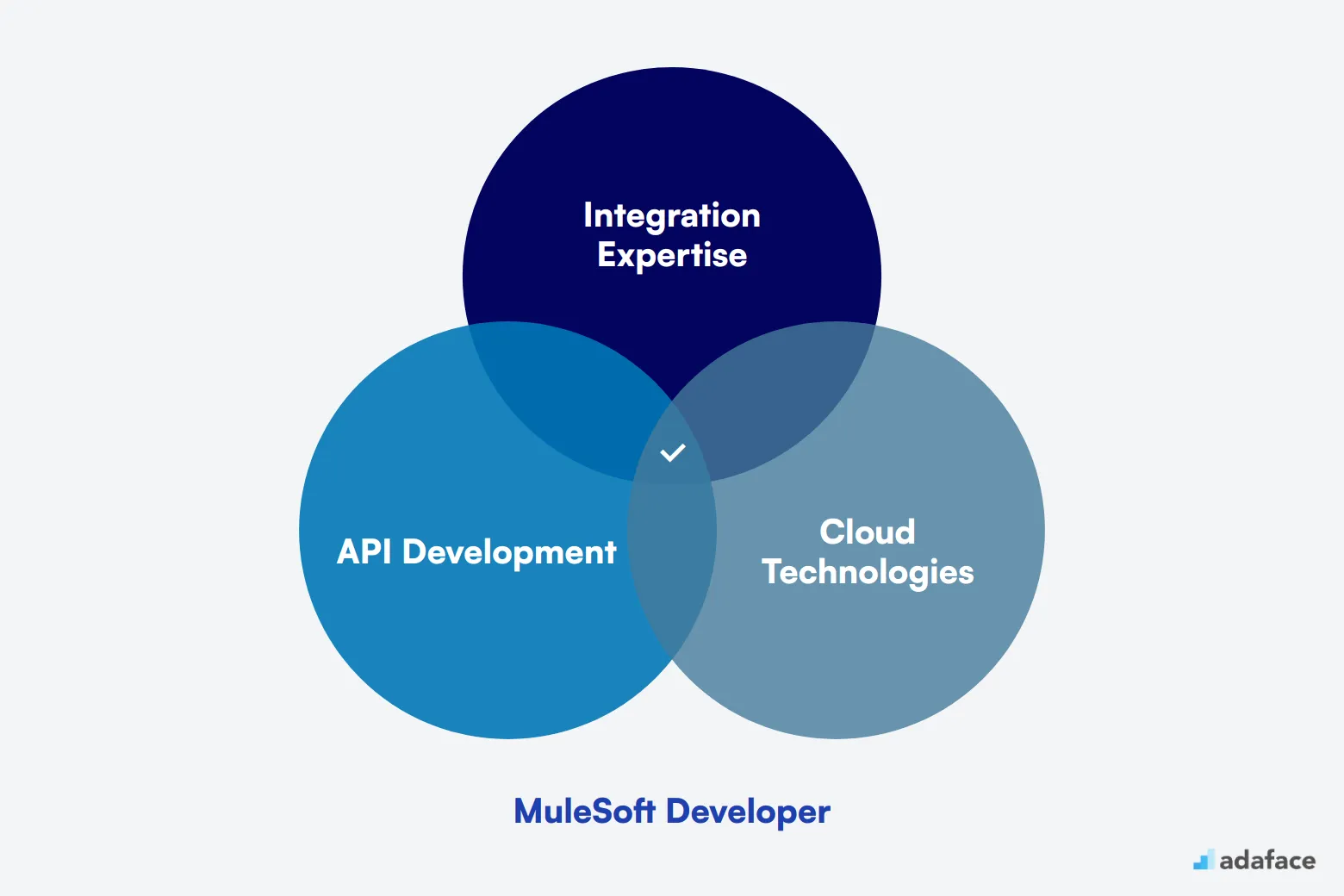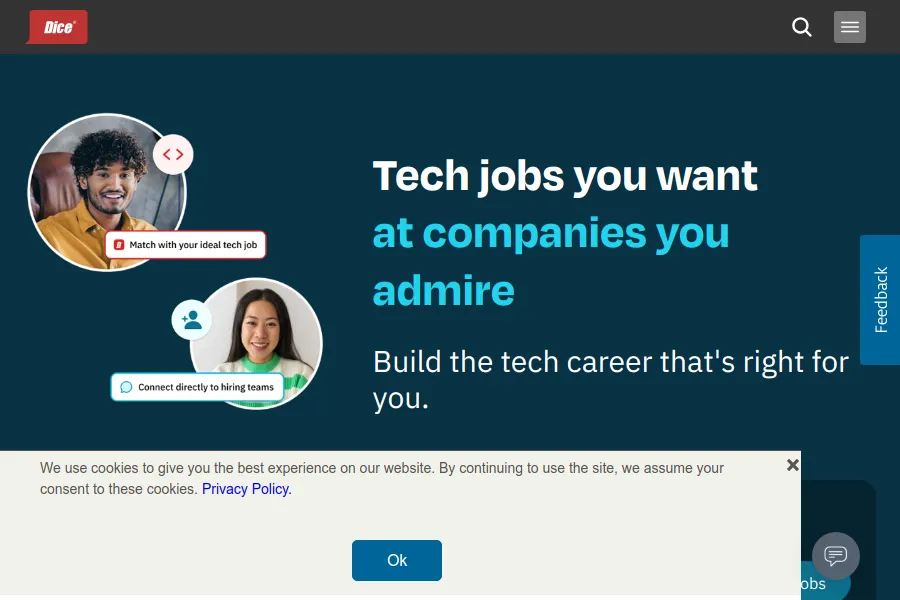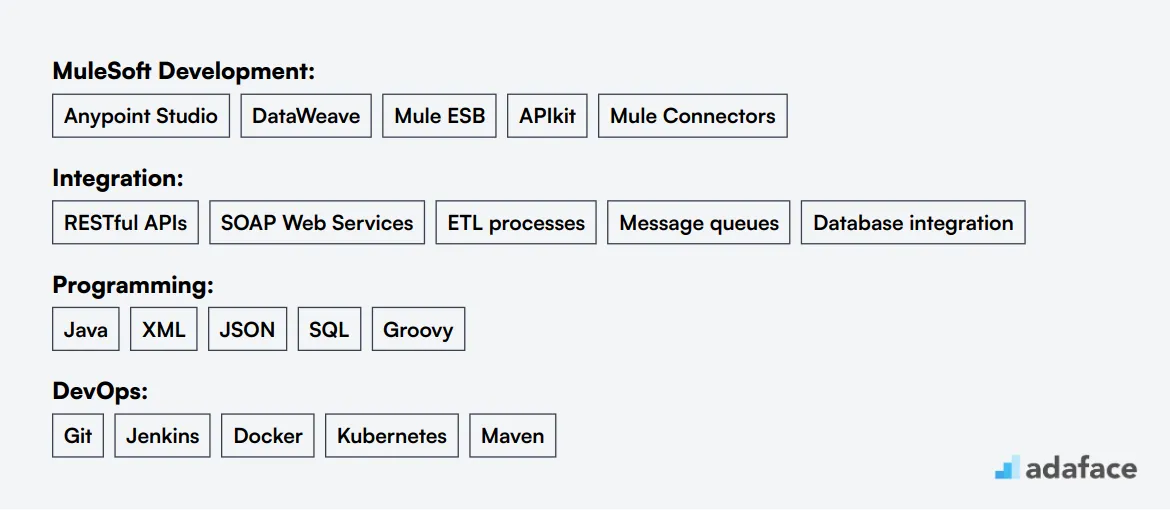Hiring MuleSoft developers can be a challenging task for recruiters and hiring managers. Many companies underestimate the specific skill set required for this role, often confusing it with general Java or API development. The key is to understand that MuleSoft developers need a unique blend of integration expertise, API design skills, and knowledge of the MuleSoft ecosystem.
This comprehensive guide will walk you through the process of hiring top-notch MuleSoft developers. We'll cover everything from identifying key skills to structuring effective interviews. To start your hiring process on the right foot, consider using our MuleSoft online assessment test to evaluate candidates' technical skills objectively.
Table of contents
Why hire a MuleSoft Developer?
To determine if you need a MuleSoft Developer, start by identifying integration challenges within your organization. For example, you might struggle with connecting multiple systems or applications, leading to data silos and inefficient workflows.
Consider these common scenarios where a MuleSoft Developer can add value:
- Streamlining data flow between legacy systems and cloud applications
- Implementing API-led connectivity for improved scalability
- Automating business processes across different platforms
If these challenges align with your business needs, it's time to consider hiring a full-time MuleSoft Developer. For smaller projects or to test the waters, working with a consultant might be a good starting point.

Identifying Key Skills and Qualifications for a MuleSoft Developer
Hiring the right MuleSoft Developer can be tricky, as the technical landscape is vast and ever-evolving. What one organization considers a must-have might be just a nice-to-have for another. Ensuring clarity between required and preferred skills is essential to attracting the best candidates.
When evaluating potential hires, focus on the following required skills: a Bachelor's degree in Computer Science or a related field, 3+ years of experience in MuleSoft development, proficiency in Java programming, and a strong understanding of API design and integration patterns. Familiarity with the Anypoint Platform and Mule runtime is also critical.
On the other hand, preferred qualifications can enhance a candidate's profile. Look for candidates with MuleSoft certifications, experience in Agile methodologies, knowledge of cloud platforms like AWS or Azure, and familiarity with CI/CD practices. Experience with microservices architecture is also a plus.
To support your recruitment process, consider leveraging tools for skills assessment to ensure candidates meet your technical standards. This can streamline the evaluation process and help you identify the best fit for your team.
| Required skills and qualifications | Preferred skills and qualifications |
|---|---|
| Bachelor's degree in Computer Science or related field | MuleSoft certifications (e.g., MuleSoft Certified Developer) |
| 3+ years of experience in MuleSoft development | Experience with Agile methodologies |
| Proficiency in Java programming | Knowledge of cloud platforms (AWS, Azure, or GCP) |
| Strong understanding of API design and integration patterns | Familiarity with CI/CD practices |
| Experience with Anypoint Platform and Mule runtime | Experience with microservices architecture |
How to Write an Effective MuleSoft Developer Job Description
Once you've outlined the ideal candidate profile, it's time to craft a compelling job description to attract top MuleSoft talent. Here are some quick tips to help you create a standout MuleSoft Developer job description:
• Highlight key responsibilities: Clearly define the role's core duties, such as designing and implementing APIs, developing integration solutions, and optimizing data flows using MuleSoft technologies.
• Balance technical requirements with soft skills: While emphasizing MuleSoft certifications and experience with Anypoint Platform is crucial, don't forget to mention important soft skills like problem-solving and teamwork.
• Showcase your company's USP: Highlight what makes your organization unique, such as exciting projects, growth opportunities, or a supportive work environment to attract top MuleSoft talent.
• Be specific about required experience: Clearly state the years of experience needed in MuleSoft development, API design, and relevant programming languages to ensure you attract candidates with the right skill level.
Top Platforms to Hire MuleSoft Developers
Once you have a well-defined job description, the next step in hiring a MuleSoft developer is to post it on relevant job listing sites. This ensures you reach a broad audience of skilled candidates, increasing the likelihood of finding the right fit for your team.
LinkedIn Jobs
Ideal for finding full-time MuleSoft developers. Large pool of professional candidates and ability to leverage network connections.

Dice
Specialized in tech jobs. Good for finding experienced MuleSoft developers for permanent positions.

Upwork
Excellent for hiring freelance MuleSoft developers for project-based work or short-term contracts.

Some platforms, like LinkedIn Jobs, Dice, and Upwork, are excellent starting points due to their large pools of qualified professionals. Other platforms such as Toptal and Guru are particularly good for freelance opportunities, ensuring high-quality candidates through rigorous vetting processes. Meanwhile, Indeed, Glassdoor Jobs, and Stack Overflow Jobs cater to full-time positions, providing access to a broad range of applicants. For those looking at remote options, FlexJobs offers a wide array of work-from-home opportunities. Lastly, AngelList Jobs is perfect if you're seeking MuleSoft developers with a keen interest in startup environments. To make the most of these platforms, optimizing your recruitment process with tools like Adaface's online assessment platform can help streamline candidate evaluation.
Keywords to Spot in a MuleSoft Developer's Resume
Screening resumes is a fundamental step to ensure you aren't swamped with unsuitable candidates. The idea is to quickly sift through applications and focus on those that best match what you're looking for. This not only saves time but also enhances the quality of your candidate pool for MuleSoft Developer roles.

First, familiarize yourself with key terms that reflect the skills and experience you seek. When scanning resumes, look for primary keywords like "MuleSoft Development" and "API Integration" mixed with secondary skills such as "DataWeave" and "Mule ESB". This approach will help you quickly identify candidates who possess the foundational skills necessary for the role.
Another approach is to leverage AI screening tools, which can save you loads of time. By utilizing AI LLMs such as ChatGPT, you can automate the process of matching resumes to desired skills. Just input the necessary keywords and let the AI highlight the best-suited candidates, reducing manual effort and ensuring a streamlined hiring process.
Here's a handy prompt to guide your AI resume screening:
TASK: Screen resumes to match job description for MuleSoft Developer role
INPUT: Resumes
OUTPUT: For each resume, provide following information:
- Email id
- Name
- Matching keywords
- Score (out of 10 based on keywords matched)
- Recommendation (detailed recommendation of whether to shortlist this candidate or not)
- Shortlist (Yes, No or Maybe)
RULES:
- If you are unsure about a candidate's fit, put the candidate as Maybe instead of No
- Keep recommendation crisp and to the point.
KEYWORDS DATA:
- MuleSoft Development (Anypoint Studio, DataWeave, Mule ESB)
- Integration (RESTful APIs, SOAP Web Services)
- Programming (Java, SQL, XML)
For more on using AI screening tools, you can explore Adaface's skill mapping and MuleSoft Developer interview questions.
Top Skills Tests to Assess MuleSoft Developers
Skills tests are a reliable way to evaluate MuleSoft Developer candidates beyond their resumes. They provide objective insights into a candidate's technical abilities and problem-solving skills. Here are five key tests we recommend for assessing MuleSoft Developers:
MuleSoft skills test: This MuleSoft online test evaluates a candidate's proficiency in MuleSoft concepts, Anypoint Platform, and integration patterns. It helps gauge their ability to design and implement MuleSoft solutions.
Java skills test: MuleSoft is built on Java, so a strong Java foundation is important. Use a Java online test to assess candidates' Java programming skills and their ability to write efficient code.
XML skills test: XML is extensively used in MuleSoft for data transformation and mapping. An XML online test can help evaluate a candidate's understanding of XML structure and processing.
REST API test: MuleSoft developers often work with RESTful APIs. A REST API test assesses their knowledge of API design principles and implementation using MuleSoft.
SQL skills test: Database integration is a common task in MuleSoft projects. An SQL online test can verify a candidate's ability to write queries and handle data operations within MuleSoft applications.
Recommended Case Study Assignments to Hire MuleSoft Developers
Case study assignments offer a practical way to evaluate a candidate's problem-solving skills and expertise in real-world scenarios. However, they can also be time-intensive and may deter candidates due to their length, potentially causing you to miss out on strong talent. To balance this, consider incorporating these targeted case studies into your hiring process.
API Integration Challenge: This assignment involves integrating multiple APIs to create a unified solution. It tests a candidate's ability to handle complex integrations, a key skill for a MuleSoft Developer. You can also assess their proficiency in REST API concepts.
Data Transformation Task: Here, candidates are asked to transform data from one format to another using MuleSoft's tools. This reflects their ability to manipulate and manage data, ensuring they can maintain data integrity across systems. Mastery in this task is crucial for projects involving large data sets.
Error Handling Scenario: This case study focuses on a candidate’s ability to implement robust error-handling mechanisms. It's essential for maintaining system stability and ensuring seamless user experiences. Understanding of system workflows and error logging is tested, simulating common real-world issues.
How to Structure the Interview Stage for Hiring MuleSoft Developers
After candidates pass the skills tests, the next step is to take them through technical interviews to evaluate their hard skills. Skills tests are excellent at filtering out unfit applicants, but they do not always identify the best candidates for a specific role. Thus, the interview stage is crucial to assessing a candidate's in-depth knowledge and practical experience, particularly through targeted interview questions.
Here are some sample interview questions that can provide insights when hiring a MuleSoft Developer:
- How do you approach designing APIs with MuleSoft Anypoint Platform? This question assesses the candidate’s understanding of API-led connectivity.
- Can you explain dataweave transformations and their role in MuleSoft? It reveals the candidate's proficiency in MuleSoft's language for data transformation.
- Describe your experience with microservices architecture. Links to both microservices and MuleSoft’s capability to support such models can be explored here.
- How do you ensure secure API integrations? This question examines the candidate's approach to security in integration.
- What are some common challenges you’ve faced while working with MuleSoft and how did you tackle them? This can provide insights into the candidate's problem-solving skills and practical experience.
Hire the Right MuleSoft Developers for Your Team
In this blog post, we discussed the importance of hiring a MuleSoft Developer, identified key skills and qualifications, and explored how to write a compelling job description. We also covered the best platforms for hiring, resume keywords to watch for, and how to assess candidates effectively through skills tests and interviews.
Remember, crafting an accurate job description and utilizing the right skills tests are the most important steps in hiring the best MuleSoft Developers. For a comprehensive assessment, consider incorporating a MuleSoft online test into your recruitment process. This will help you identify candidates who not only match the required skills but also align well with your project needs.
Mulesoft Assessment Test
FAQs
Key skills for MuleSoft developers include proficiency in Java, XML, REST APIs, SQL, cloud computing, and DevOps practices. They should also have hands-on experience with MuleSoft's Anypoint Platform and a strong understanding of integration patterns.
You can assess MuleSoft skills through a combination of technical interviews, coding tests, and practical case studies. Consider using MuleSoft-specific online tests to evaluate candidates' knowledge and problem-solving abilities.
Good places to find MuleSoft developers include specialized job boards, LinkedIn groups focused on MuleSoft and integration technologies, MuleSoft community forums, and professional networking events. You can also consider partnering with MuleSoft training providers or consulting firms.
A MuleSoft developer job description should include required technical skills, experience with specific MuleSoft tools, desired certifications, and relevant industry experience. Be sure to highlight any unique projects or integration challenges they'll be working on. You can refer to our MuleSoft developer job description template for guidance.
Structure the interview process to include an initial screening, a technical assessment, a practical coding challenge, and a final interview focusing on cultural fit and soft skills. Consider involving your current MuleSoft experts in the technical evaluation stages.
Red flags include candidates who lack hands-on experience with MuleSoft tools, those who can't explain integration concepts clearly, or those who show no interest in keeping up with MuleSoft's evolving ecosystem. Be wary of developers who claim expertise but can't provide concrete examples of projects they've worked on.
While certifications are valuable, they shouldn't be the sole deciding factor. Look for a balance of certified knowledge and practical experience. Certifications demonstrate a commitment to learning, but real-world project experience is equally important in assessing a candidate's capabilities.

40 min skill tests.
No trick questions.
Accurate shortlisting.
We make it easy for you to find the best candidates in your pipeline with a 40 min skills test.
Try for freeRelated posts
Free resources



